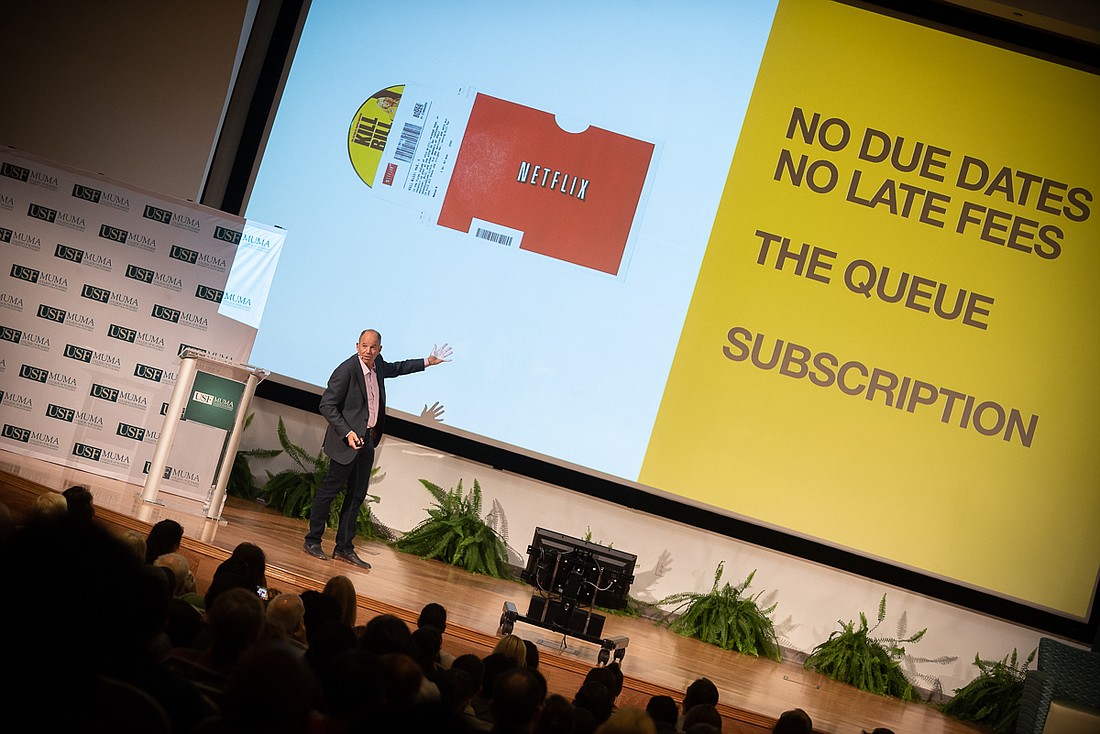- July 26, 2024
-
-
Loading

Loading

Netflix co-founder Marc Randolph looks back fondly on the day in 2000 when Blockbuster laughed in his face when trying to sell the business. At the time, Blockbuster, a $6 billion company, couldn’t imagine why a startup with $5 million in revenue thought it could be sold for $50 million — an amount equal to its debt.
Randolph remembers sitting on the plane on the way home from the meeting with his head down thinking, “Now we’re going to have to kick their ass…and we did.”
'Big or small, if you are unwilling to disrupt yourself, you are leaving things wide open for someone else to disrupt your business for you.' Marc Randolph, co-founder Netflix
With that story as backdrop, the Santa Cruz, Calif.-based entrepreneur-turned-angel investor visited the University of South Florida Muma College of Business recently, part of the Muma Thought Leader Series. Randolph, 60, talked about the thrilling ride from Netflix’s first customer in 1998 to 130,000 subscribers a little more than two years later to 139 million subscribers in almost every country in the world today. Randolph also shared his thoughts on building a thriving startup and the need to disrupt the status quo — advice important for both new and experienced companies.
People “take legacy way too seriously,” says Randolph, who has been behind at least seven startups and assisted hundreds of entrepreneurs. “Customers don’t care about preserving old models…big or small, if you are unwilling to disrupt yourself, you are leaving things wide open for someone else to disrupt your business for you.”
Disruption is how Randolph and his onetime software firm colleague and Netflix co-founder Reed Hastings turned the company from an upstart DVD mail-rental service into a content streaming juggernaut. Randolph says that happened, when, knowing Amazon and Walmart were on their heels with online sales and potential rentals, they shifted to streaming, which was then in its infancy.
DVDs accounted for almost all of Netflix’s sales at the time. “When you walk away from 99% of your revenue, it has a way of focusing your mind,” Randolph admits. “We were desperate to figure this out.”
They figured it out so well that Netflix, of course, is a global power and one the 10 largest internet companies, by revenue, in the world. Randolph’s post-Netflix advice in how to build a successful company includes many lessons from that transformative experience.
A big key, he says, is you don’t need to be particularly smart. Instead of being smart, Randolph says a successful entrepreneur needs to have three things: a tolerance for risk, an idea and confidence.
• On risk, “you have to be willing to start before you know where the path leads,” Randolph says. But that doesn’t mean you can “wander aimlessly,” he cautions. You have to have guiding principles and a sense of direction. Entrepreneurs, he adds, also have to have a predisposition for action. “Don’t spend time thinking — learn more by doing.”
• The idea, meanwhile, doesn’t have to be a blockbuster. “It doesn’t need to be a big idea…it does not need to be original…it does not need to be complicated…it doesn’t even need to be a good idea — what really is a good idea?” Randolph asks.
He’s been told multiple times his ideas are stupid (even Netflix when he first started). But he doesn’t let that stop him from trying. “Build something, test something, try it…collide it with the real world — that’s where you’ll learn if it is a good idea or a bad idea.”
• On confidence, finally, Randolph is pragmatic and prophetic. “Don’t fall in love with your idea,” he says, “fall in love with the problem and believe you are the person that can solve it.”